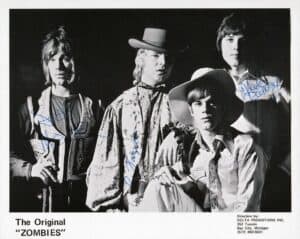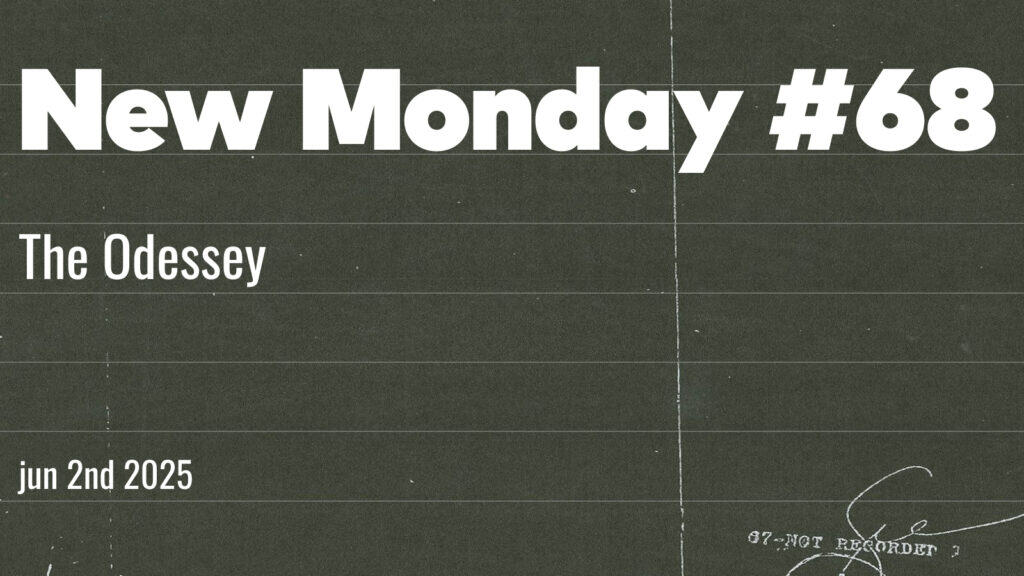New Monday #68
Happy Monday -
I finally managed to record an audio version of New Monday. It follows the written one closely, but there is some additional info in it, and I edited in the musical examples as well. Hear it here.
Here's the tale, an odyssey, if you will, of one of the greatest albums anyone has ever made.
The opening song contains these lyrics:
And we'll get to know each other for a second time
And then you can tell me about your prison stay
Care of Cell 44 was released as the first single of a great album, the Zombies' Odessey and Oracle. It flopped. Well, a love song that features a guy writing to his girlfriend who's in jail is pretty challenging material for 1968.
The singer is Colin Blunstone, and there's no indication in the lyrics of gender: It's safe to assume he's not singing as a woman. England had, after all, only just passed the Sexual Offenses Act, which decriminalized homosexuality. There were things one didn't do even during the summer of love and after it.
Huge drums and bass on this, for the time, and it sounds a bit like The Beatles. That’s because it was recorded at Abbey Road, by Geoff Emerick, with all of the techniques and technology used on Sgt. Peppers only a few months before. Towards the end is a Mellotron, owned by John Lennon, that keyboardist and Zombies leader Rod Argent sprinkled all over the album.
The Zombies were on the verge of breaking up when they recorded Odessey and Oracle. The issue was mainly money. They hadn't had hits since "Tell Her No" and "She's Not There", and the only members of the band making anything were the writers, Rod Argent and bassist Chris White. Guitarist Paul Atkinson—broke and about to be married—was as good as out. After leaving the Zombies he became a record exec and signed ABBA, Elton John, and Bruce Hornsby. Drummer Hugh Grundy, whose wonderful playing is all over the album, also became an A&R man.
The Zombies met in school. All were highly educated, and by the time they started Odessey and Oracle, Argent and White didn't feel like writing strictly pop tunes, and were interested in classical motifs, jazz, and lyrics pulling ideas out of Shakespeare and William Faulkner. Chris White's fascination with World War 1 led to Butcher's Tale (Western Front 1914), a depressing ballad featuring a foot-pumped organ and White's vocals rather than Colin Blundstone's. American producer Al Kooper (Lynyrd Skynyrd) persuaded an American record company, Date, to release it as a single. Vietnam and all—the label thought it would resonate with the kids. It flopped. No one in the Zombies was at all surprised.
Due to a minuscule recording budget of just 1000 pounds for the whole album, the Zombies entered the studio very well rehearsed, and basically busted out songs to four-track tape, spending not more than a couple of hours per tune, including the mixes. The five all played together live, would overdub a few vocals and then on to the next tune. When Abbey Road was booked out, they'd jump across town to Olympic. They worked without a producer, which suited Argent and White just fine—they got to try out all sorts of ideas on the record. It also led to problems like the band not bothering to record stereo mixes, because at the time records were mainly in mono. The label demanded stereo mixes and forced the band to pay an additional 200 pounds for them out of their own pockets.
Here's the mono mix of This Will Be Our Year. Note the horn part. It's missing from the stereo mix. That's because the part was added during the mono mix. It never hit the multitrack tape and so it simply wasn't there for the stereo remix sessions.
One of the last songs cut for the album was Time of the Season. Singer Blunstone didn't like it. He and Argent fought over how to sing it. Argent won the argument. The distinctive "clap ah" was a last-minute overdub idea by Rod Argent, who ran into the studio to perform it. He also overdubbed a second organ solo.
By the time the record was complete in early 1968 the Zombies were broken up. There wasn't even enough interest from the label or the band to fix the misspelling of the album's title on the artwork, so rather than redo the cover, they just renamed the album from Odyssey and Oracle to Odessey and Oracle.
CBS Records declined to release the record in the US after "Care of Cell 44" flopped in England, hence why Butcher's Tale was released by Date.
In late 1968, a station in Iowa began playing "Time of the Season". It began to climb the charts and suddenly Date Records had a top ten hit US and Canadian on its hands. "Time of the Season" charted all over the world and is now considered an absolute classic, and is the biggest hit the Zombies had.
And some guys in Michigan decided to cash in on it.
Delta Promotions of Bay City, Michigan was a legitimate company when they hired a bunch of American musicians to tour as The Zombies throughout the US. They told the bands, who were just kids, really, that they had acquired the rights to both the Zombies and the Animals (they also had a fake Animals out on tour). They slapped together bands, took promo pictures, stuck them in vans and sent them out.
Fun times! Zombies fans would show up and wonder where the keyboard player was. The bands would claim that he died, or was in jail. The audience would stay for a few songs and then leave the venue as it became clear that the band onstage wasn't the band on the record.
One of the fave Zombies bands, which consisted of musicians from Texas, would open with "Time of the Season" and then switch to what they actually really knew, which was Texas blues. Because the nucleus of this particular version of the Zombies was Billy Gibbons and Frank Beard, who later went on to form ZZ Top.
Odessey and Oracle has aged well. The playing is spot on, the vocals are pitch perfect, and the songs are inventive with wonderful melodies and arrangements. There are a handful of great psychedelic albums from this time— Sgt Peppers, The Moody Blues Days of Future Passed, Jimi Hendrix' Axis: Bold as Love, and certainly Odessey and Oracle is one of them.
Odessey and Oracle:
If you listened to the audio version of this particular New Monday episode, please let me know what you think and what I can do to make it better.
Warm Regards,
Luke


